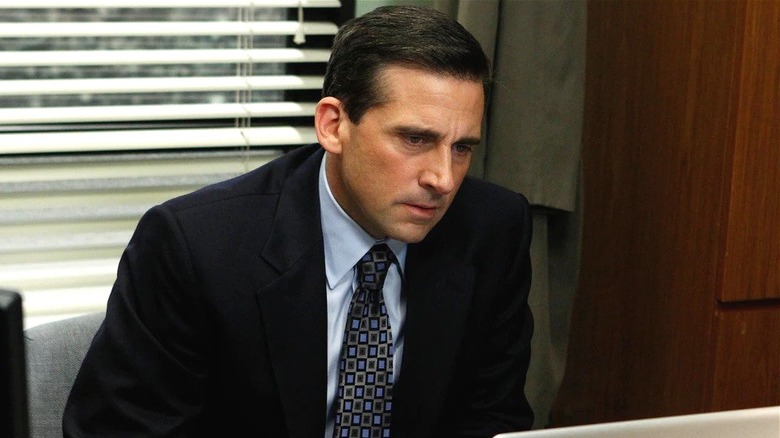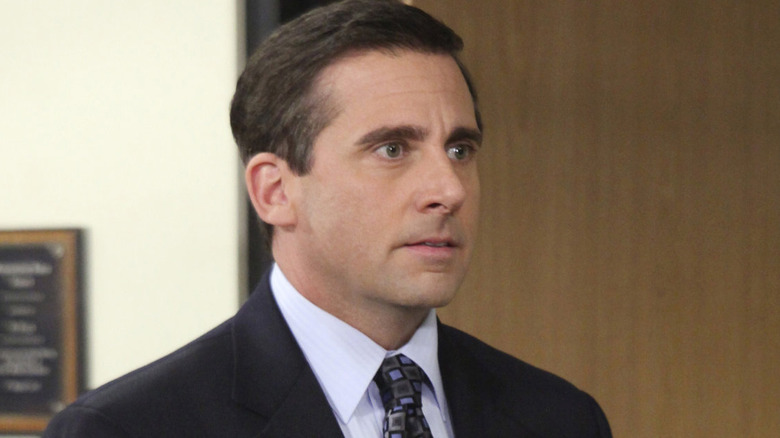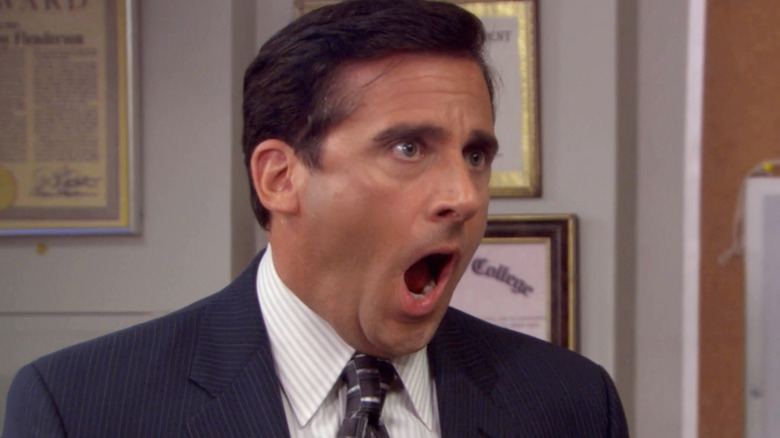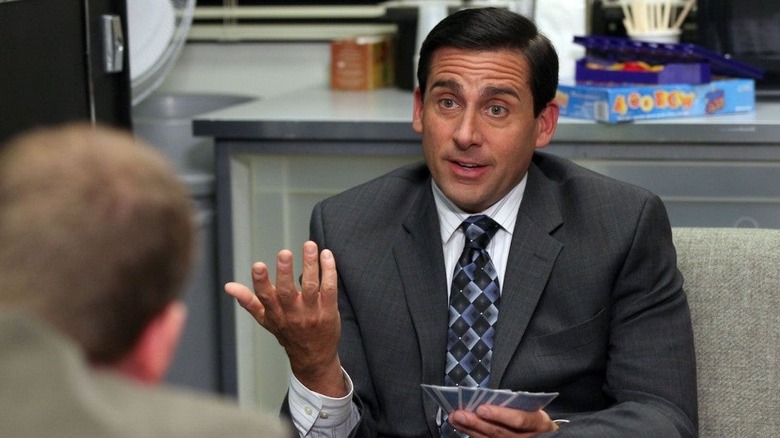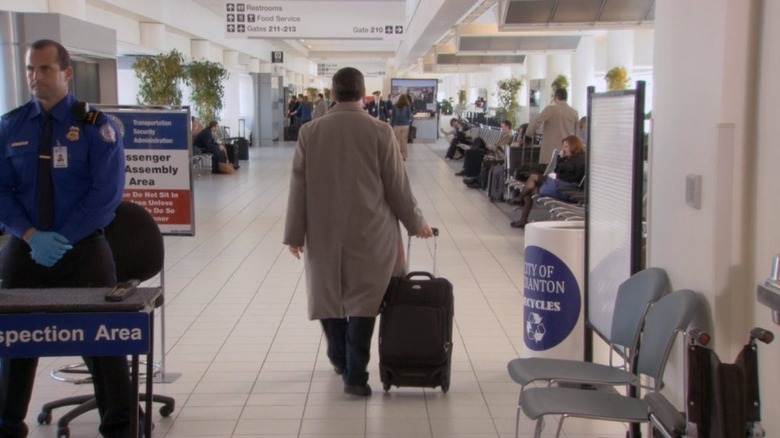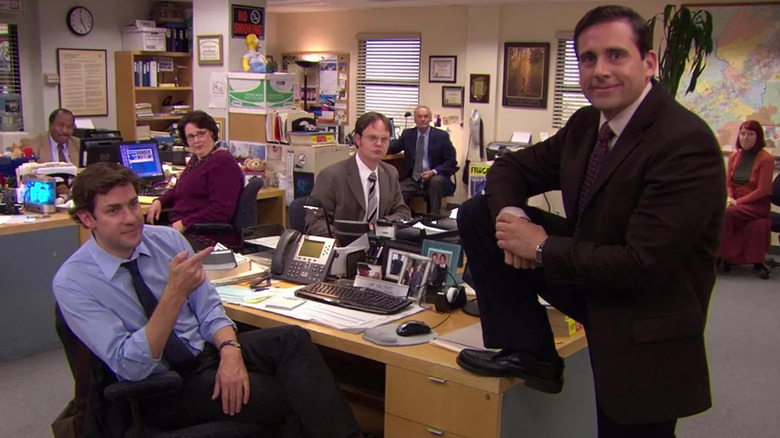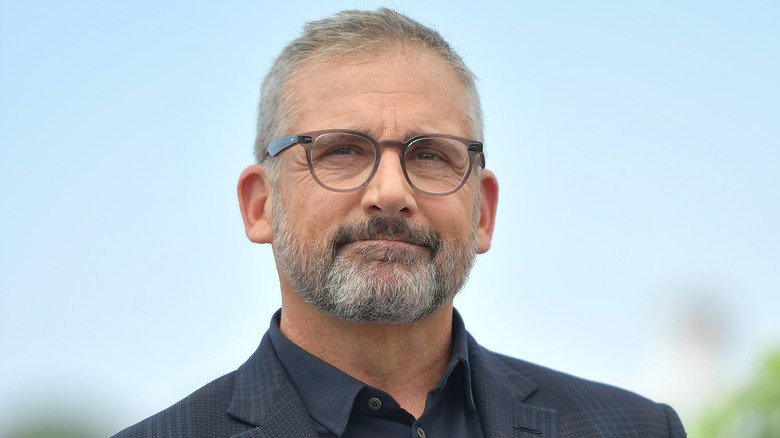The Reason Steve Carell Left The Office After Season 7
"Oh, this is going to feel so good, getting this off my chest ... that's what she said."
Hard as it may be to believe, over a decade has passed since Steve Carell uttered those churlish last words and walked away from the small-screen role that made him a household name. The role was that of Michael Scott — the charmingly-slash-infuriatingly tone-deaf man-child who served as Regional Manager of Scranton, Pennsylvania's Dunder Mifflin branch. The show was, of course, NBC's groundbreaking mockumentary comedy "The Office" – itself inspired by Ricky Gervais' beloved UK series of the same name. Though Carell spent seven mostly brilliant seasons on "The Office," he shocked both fans and critics alike when he announced that after so many years — and 138 groaningly hilarious episodes — of living inside the often cringe-inducing world of the wannabe "World's Best Boss," he was ready to move on from both the character and the series.
Carell bid a fond, tear-filled adieu to his Dunder Mifflin family on one of "The Office's" best episodes – and, like Scott himself, the actor set out for proverbial greener pastures. While Carell would reprise the role just a couple of years later in a memorable cameo for "The Office's" series finale, it's finally become clear exactly why the actor chose to walk away from a show and character that now rank among the best-loved in television history.
The first time Steve Carell felt he should leave The Office
In April 2010, Steve Carell made the first public mention that his days in the fictional Dunder Mifflin office were possibly numbered. He told the BBC (via Entertainment Weekly) that because his contract for "The Office" only ran through Season 7, the then-forthcoming season would "probably be [his] last year" on the series. According to interviews published in Andy Greene's book "The Office: The Untold Story of the Greatest Sitcom of the 2000s," which was published on March 24, 2020, a lack of internal response to Carell's comment about Season 7 potentially being his last actually made the actor feel like it was time to leave.
Brian Wittle, who worked as a boom operator and sound mixer on "The Office," explained the sequence of events in the book (via Collider). "[Carell] was doing a radio interview and he haphazardly mentioned, almost unconsciously, that it might be his last season. He didn't plan on saying it out loud and he hadn't decided anything. He was kind of thinking out loud, but he did it in an interview in public and it created news. Then what he said was the people connected to the show had no reaction to it. They didn't call and say, 'What? You wanna leave?' He said he didn't get any kind of response from them," said Wittle. "When he realized he didn't get any kind of response from them, he thought, 'Oh, maybe they don't really care if I leave. Maybe I should go do other things.'"
Steve Carell didn't want to go, but NBC reportedly left him no other choice
Elsewhere in "The Office: The Untold Story of the Greatest Sitcom of the 2000s," hairstylist Kim Ferry corroborated Wittle's story, further noting that Carell "didn't want to leave the show" and had told NBC brass that he planned on signing a new contract that would be good for a few more years. According to Ferry, however, network executives simply didn't reach out to him about negotiating a new deal.
"He planned on staying on the show. He told his manager and his manager contacted [NBC] and said he's willing to sign another contract for a couple years. So all of that was willing and ready and, on their side, honest," Ferry detailed. "And the deadline came for when [NBC executives] were supposed to give him an offer and it passed and they didn't make him an offer. So his agent was like, 'Well, I guess they don't want to renew you for some reason.' Which was insane to me. And to him, I think."
She continued, noting that Carell didn't want to leave "The Office" behind — he simply had no other choice. "[Carell] was like, 'Look, I told them I want to do it. I don't want to leave. I don't understand.' It just is mind-boggling how that happened," shared Ferry. "And I feel bad because I think a lot of people think he did leave the show on his own merit and it's absolutely not true. I'm telling you. I was there. I was there. He really wanted to stay. And it devastated all of us because he was the heart of our show."
Allison Jones — a casting director who's worked on "Freaks and Geeks," "Brooklyn Nine-Nine," "The Good Place," "Parks and Recreation," "Arrested Development," "The Office," and more — called the whole situation "absolutely asinine" since Carell truly wanted to stay on the show. She stated, "As I recall, he was going to do another season and then NBC, for whatever reason, wouldn't make a deal with him."
Steve Carell reportedly needed some R-E-S-P-E-C-T, but didn't get it
"The Office" producer Randy Cordray offered another element that contributed to Carell's departure: the arrival of Bob Greenblatt, who became the chairman of NBC Entertainment in 2011. Allegedly, Greenblatt "was not as big a fan of 'The Office' as we wished he would've been" and "took 'The Office' for granted." Cordray noted his belief that Carell likely would have stayed on the show if there was more respect coming from NBC: "If you're not respected and don't even get offered a contract or a discussion of a future contract, then you move on."
For what it's worth, Greenblatt maintained in "The Office: The Untold Story of the Greatest Sitcom of the 2000s" that he "couldn't do anything about" Carell leaving the series, since he believed it was already happening before his promotion.
Steve Carell later said he felt like his exit came at the right time
Putting aside the circumstances detailed in Andy Greene's oral history, Steve Carell has addressed his departure recently and said that it was actually the right time — in that it wrapped up his character's storyline in a satisfying way. Speaking to former co-stars Jenna Fischer and Angela Kinsey on their popular recap podcast "Office Ladies" in March of 2023, Carell, asked about his favorite episode, invoked Michael's final full episode right away.
"Oh, you know, my last one, talk about heart, it was a really difficult episode to do, but I also loved it at the same time because it was sort of that end game for Michael," Carell said. "It was that- the culmination, the sort of showing the growth that he didn't need the big sendoff. He didn't need the big party. He could say goodbye to all of his friends on his own terms without any of the, you know... fanfare."
When Fischer and Kinsey recalled that it was a difficult final few weeks on set with Carell, largely because everybody loved him so much, the seemingly modest star demurred and said he felt it was time for him to go. "I don't know," Carell said. "You know, I could look at it that... I'm I don't know. I don't want to make too much of it. But it was difficult because, you know, we were such good friends and it had been so much fun and so rewarding in a lot of ways, all ways. But at the same time, there was this, for me, there was a joy to it. You know, when you– you– you're crying with joy. Because it wasn't even sadness. Like because I was ready, I was ready to go. And so I wasn't sad about leaving."
Michael's exit made room for other characters, according to Steve Carell
Not only did Steve Carell tell Jenna Fischer and Angela Kinsey that his timing was right for Michael's overall journey, he specifically mentioned that his exit would allow other characters to take center stage.
"Yeah. No, it was. It was time," Carell explained. "And it was time. It was time for other characters to kind of step to the forefront and— and other storylines to be pursued. It was just I think it was the right, it was that the timing was right, I think, for everybody. But simultaneously there was just a sense of joy for me that we had experienced all of this and we were getting- I was getting a chance to kind of take a lap with everybody. And the way, you know, those last few episodes were structured, it felt very rich to me to kind of simultaneously be saying goodbye as Michael and, you know, us as— as friends, you know, in this moment of work together. But yeah, it was a lot. It was a very emotional thing."
Now, whether or not that actually paid off is a big question for fans of "The Office," considering how poorly new characters like Nellie Bertram (Catherine Tate) were received after Michael's exit... but clearly, Carell got the closure he wanted from his final days on set.
Steve Carell has stayed plenty busy since The Office
Ultimately, Steve Carell's career definitely didn't suffer after he left "The Office." The guy has basically been on an upward trajectory ever since, in fact. The same year he left the popular show, he appeared in "Crazy, Stupid, Love," following that with indie movies like 2012's "Seeking a Friend for the End of the World" and 2013's "The Way Way Back" as well as continuing his franchise streak in the "Despicable Me" movies. 2014 brought Carell's first brush with major awards shows thanks to his showy yet terrifying central performance as John Eleuthère du Pont in "Foxcatcher," and he picked up more nominations the following year working with his "Anchorman" director Adam McKay on "The Big Short." After a string of films that included "Welcome to Marwen," "Beautiful Boy," and "Vice," Carell appeared alongside a star-studded cast in Wes Anderson's "Asteroid City" in 2023.
Carell made his grand return to television in 2019, turning to drama with AppleTV+'s flagship series "The Morning Show," where he plays disgraced news anchor Mitch Kessler. With his character killed off in Season 2, Carell was free to return to comedy, but his Netflix series alongside Greg Daniels, "Space Force," produced seriously diminishing returns (and ended up canceled). Most notably in the 2020s, though, Carell starred with Domhnall Gleeson in the limited series "The Patient," where he portrays a therapist kidnapped by his violent, unstable patient (Gleeson).
